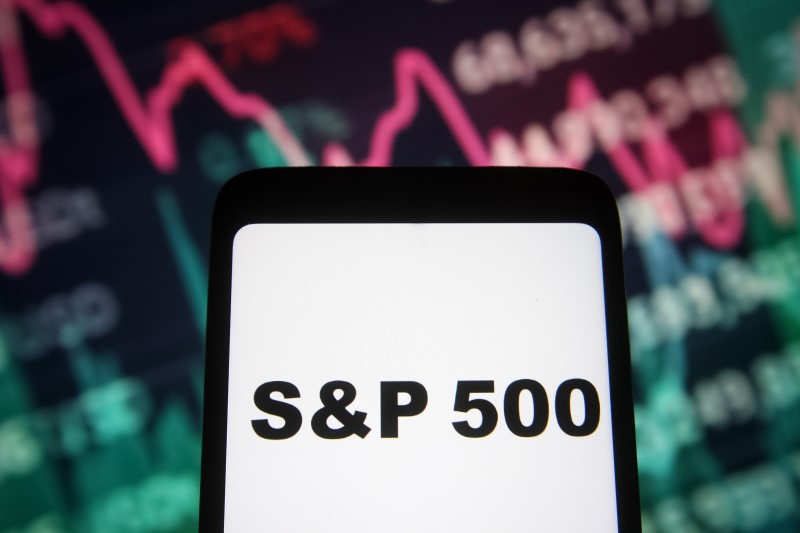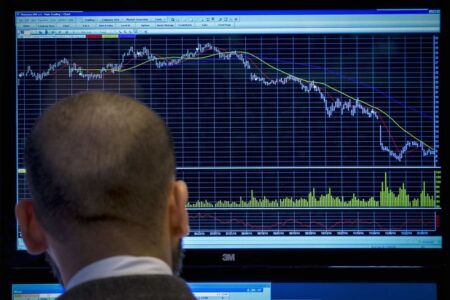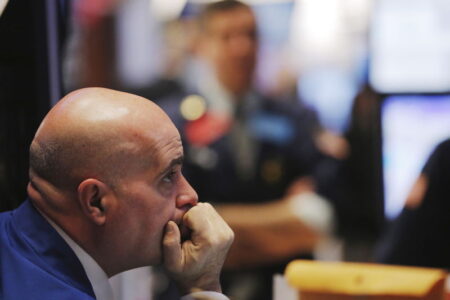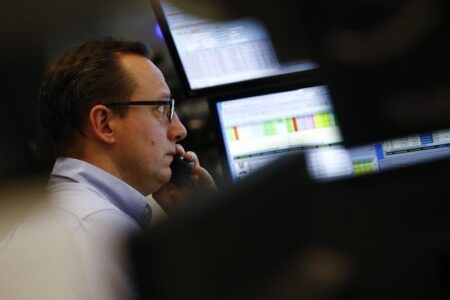© Reuters. FILE PHOTO: A man walks past an electric monitor displaying Nikkei share average and the Japanese yen exchange rate against the U.S. dollar outside a brokerage in Tokyo, Japan May 2, 2023. REUTERS/Issei Kato
By Lawrence White and Koh Gui Qing
NEW YORK/LONDON (Reuters) – World stocks and the dollar dipped on Monday as investors mulled whether the Federal Reserve will refrain from raising rates in June after data last week showed slowing U.S. wage growth, while oil prices steadied after Saudi Arabia vowed big output cuts.
The benchmark lost 0.2%, the Index was little changed and the Dow Jones Industrial Index dropped 0.59%.
The key European STOXX index fell 0.48%, compared to a 0.22% gain in MSCI’s broadest index of Asia-Pacific shares outside Japan.
had surged 2.1% to stand above 32,000 for the first time since July 1990.
While last week’s stock market rally appeared to have paused, the U.S. data released on Friday showing wage pressures easing and the unemployment rate climbing off a 53-year low gave hope that the Fed is making further progress against inflation.
Further bolstering hopes that the Fed might pause its monetary policy tightening cycle was Monday’s data that showed the U.S. services sector barely grew in May as new orders slowed.
A pause in interest rate rises will help support the U.S. S&P 500, which some analysts say is flashing “bullish signals.”
“The SPX cleared 4,200 last week to break out from an early February into early June bullish cup and handle,” said Stephen Suttmeier, technical research strategist at Bank of America (NYSE:) Securities.
“This favors new 52-week highs above the August 2022 peak at 4,325 and projects further upside into the 4,500s.”
Oil prices, which have come under pressure amid heightened concerns about China’s slowing economy, rose after Saudi Arabia announced it would cut its output to 9 million barrels per day in July, from around 10 million bpd in May, the biggest reduction in years.
rose 0.8% to $76.71 a barrel, while edged up 0.6% to $72.15 a barrel, after hitting a session high of $75.06.
“With Saudi Arabia protecting oil prices from sliding too low … we think oil markets are now more prone to a shortfall later this year,” said Vivek Dhar, a mining and energy commodities strategist at Commonwealth Bank of Australia (OTC:).
“We think Brent futures will rise to $85 by Q4 2023 even with a tepid demand recovery in China factored in.”
HEY JUNE, DON’T MAKE IT BAD
Data on Friday showed the U.S. economy added 339,000 jobs last month, more than most estimates, but moderating wage growth and the rising jobless rate led markets to price a 75% chance of no change in Fed rates in June, according to the CME FedWatch tool.
That would be broadly positive for stocks, but there is a roughly 70% probability that the fed funds rate would reach 5.25-5.5% or beyond at the Fed’s policy meeting in July if U.S. inflation remains elevated. Markets see little chance of a rate cut by year-end.
Expectations that the Fed will not raise rates in June helped non-yielding bullion. climbed 0.7% to $1,961.30.
In Treasuries, yields retreated after rising earlier, in part on concerns that an impending issuance of $1 trillion or more in short-term debt may tighten credit conditions. Yields on U.S. two-year Treasuries retreated to 4.4742% after climbing as high as 4.5750%, and 10-year yields edged down to 3.6869%, after a rise of 8 bps on Friday.
Fitch Ratings said the United States’ “AAA” credit rating would remain on negative watch despite the debt agreement.
The U.S. dollar was at 104.01 against a basket of six currencies on Monday, after gaining 0.5% on Friday on the jobs report. The greenback was flat on the Japanese yen at 139.65 while the euro was unchanged at $1.0708.
Central banks from Australia and Canada will meet this week. Markets see a sizeable chance of about 40% that the RBA could surprise with a quarter-point hike on Tuesday, after a minimum wage hike that economists feared could further stoke inflationary pressures.
The Bank of Canada will meet on Wednesday. A majority of economists polled by Reuters expect the BOC to keep interest rates on hold at 4.5% for the rest of the year although the risk of one more rate rise remains high.
Read the full article here












